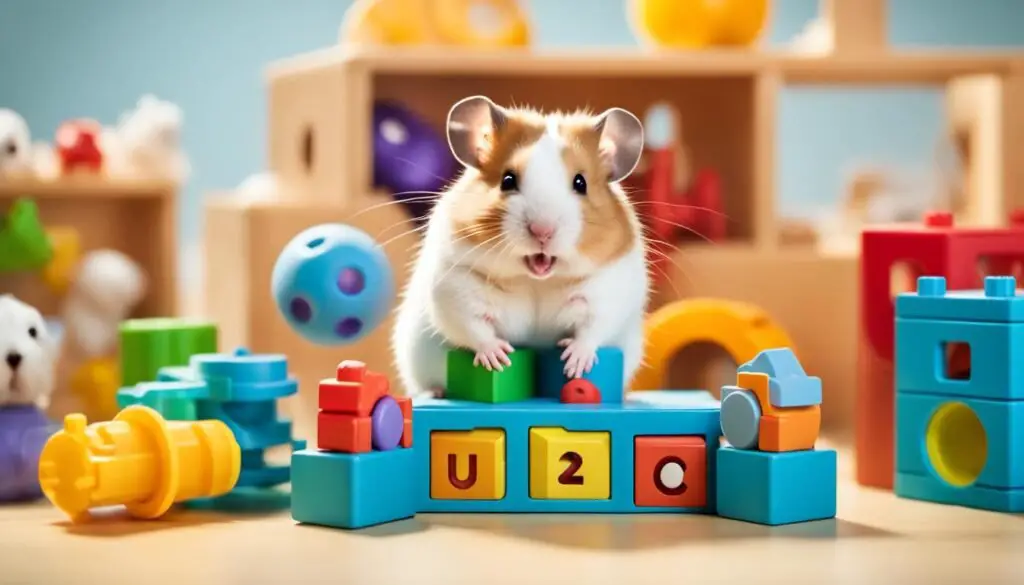Did you know that hamsters possess remarkable cognitive abilities? These furry little creatures, often underestimated for their size, have intelligence that can surprise even the most skeptical. From their exceptional spatial memory to their problem-solving skills, hamsters exhibit a level of cleverness that will leave you in awe.
In this article, we will delve into the fascinating world of hamster intelligence. We will explore how intelligent hamsters truly are, compare their cognitive abilities to other small pets, and discuss ways to test and improve their intelligence. So, if you’re ready to uncover the secrets of these smart hamsters, let’s dig in!
Before we dive deeper into their intelligence, it’s important to understand that various factors can influence a hamster’s cognitive abilities. Genetics, environment, diet, socialization, and age all play a role in determining just how intelligent a hamster can be. So, let’s explore what makes these small creatures so fascinating and how we can unlock their true potential through mental stimulation and enrichment.
The Intelligence of Hamsters Compared to Other Small Pets
When it comes to intelligence, hamsters are quite remarkable creatures. Known for their adorable appearance and playful nature, they also possess impressive cognitive abilities. Hamsters have excellent spatial memory and problem-solving skills, making them incredibly resourceful pets.
With their keen sense of spatial awareness, hamsters can easily remember the layout of their environment. From the location of their food bowl to the placement of their favorite hideouts, they navigate their surroundings with ease. This exceptional spatial memory allows them to find their way back home after exploring or escaping their cages.
Hamsters also display problem-solving skills, which further demonstrate their intelligence. They possess the ability to figure out how to escape from their enclosures, whether through stealthy maneuvers or clever exploits. Additionally, they can locate hidden spots to stash their food, ensuring a secret supply for later enjoyment.
While hamsters are often compared to other small pets like guinea pigs and rabbits, they stand on par in terms of intelligence. Each animal has its unique traits and capabilities, but when it comes to problem-solving and cognitive abilities, hamsters are just as adept. Their intelligence adds an extra layer of excitement and interaction to the already delightful experience of having a small pet.
Testing and Improving Hamster Intelligence
If you’ve ever wondered about your hamster’s intelligence, there are ways to put their cognitive abilities to the test. By engaging in problem-solving exercises and memory tests, you can gain insight into your furry friend’s cleverness and adaptability. It’s not just about satisfying curiosity; testing your hamster’s intelligence can help you understand their potential and provide opportunities for growth and enrichment.
To improve your hamster’s cognitive abilities, it’s essential to provide them with mental stimulation and enrichment. Training sessions, environmental enrichment, and interactive toys all play a crucial role in enhancing their intelligence. Through training exercises, you can teach your hamster fun tricks and reward their learning progress. Environmental enrichment involves creating an engaging and stimulating living environment by adding tunnels, obstacles, and hiding spots for treats. Interactive toys, such as puzzle feeders, further engage your hamster’s mind and encourage problem-solving skills.
Not only does working on your hamster’s intelligence benefit their overall well-being, but it also strengthens the bond between you and your pet. As you engage in training and enrichment activities together, you’ll enhance your connection and enjoy a deeper level of interaction. Plus, a smarter hamster is a happier hamster!
Factors that Affect Hamster Intelligence and Learning
When it comes to hamster intelligence, various factors come into play, shaping their cognitive abilities and learning capacity. Genetics, environment, diet, socialization, and age all play a crucial role in determining how intelligent and receptive a hamster can be.
Genetics, for instance, can influence a hamster’s innate intelligence level. Some hamsters may possess natural intelligence that sets them apart from others. However, even if your hamster is not genetically predisposed to be exceptionally intelligent, with the right approach, training, and enrichment, any hamster can enhance their cognitive abilities and become smarter.
The environment in which a hamster lives also has a significant impact on their intelligence. Providing a stimulating and enriching environment helps promote their cognitive development. The presence of toys, hiding spots, and interactive activities can engage their minds and encourage problem-solving skills.
Diet is another important factor in hamster intelligence. A balanced diet rich in essential nutrients and vitamins is vital for the overall well-being of your hamster, including their brain function. Providing a nutritious diet tailored to their specific needs can support their cognitive performance and improve their ability to learn.
Socialization is crucial for hamsters to develop their intelligence. Regular interactions and socialization with their human caregivers can enhance their cognitive abilities and promote mental stimulation. Spending quality time with your hamster, bonding through play, and providing opportunities for mental engagement can contribute to their overall intelligence.
Lastly, age plays a role in the hamster’s learning capacity. Younger hamsters tend to be more receptive and adaptive to learning compared to older ones. However, regardless of age, continuous mental stimulation and enrichment through various activities can help older hamsters maintain and even improve their cognitive abilities.
By considering these factors and implementing the right strategies, you can help unlock your hamster’s full potential and create a stimulating environment that nurtures their intelligence and fosters their well-being.

The Importance of Mental Stimulation and Enrichment for Hamsters
Mental stimulation and enrichment are vital for your hamster’s overall well-being. These activities engage their minds, prevent boredom and depression, and promote better cognitive function. Just like humans, hamsters need mental exercise to stay happy and healthy.
One way to provide mental stimulation for your hamster is to offer a variety of toys and activities. Toys that encourage problem-solving, such as puzzle feeders or interactive toys, can keep your hamster entertained and mentally engaged. Consider hiding treats around their enclosure to encourage natural foraging behavior, which provides both physical and mental stimulation.
Creating obstacle courses using tunnels and ramps can also provide mental and physical exercise for your hamster. Not only will they have fun exploring the different areas, but it can also help improve their agility and problem-solving skills.
Training your hamster in tricks is another way to stimulate their mind. Start with simple commands, such as teaching them to come when called or weave between your fingers. With patience and positive reinforcement, your hamster can learn new tricks and enjoy the mental challenge.
By providing mental stimulation and enrichment for your hamster, you are not only enhancing their quality of life but also strengthening the bond between you and your pet. This helps them feel secure and content in their environment.
Remember, a happy and mentally stimulated hamster is a healthy and well-adjusted hamster. With a few simple additions to their habitat and regular mental exercise, you can ensure that your furry friend remains engaged, curious, and mentally sharp.
Overcoming Cognitive, Emotional, and Moral Speciesism
When discussing the intelligence and well-being of animals, it is crucial to move beyond the notion of species and focus on the individual. Each creature, from the smallest hamster to the largest whale, possesses a unique capacity for joy and pain. By categorizing animals based on their species and assuming some are more sentient than others, we engage in speciesism.
Speciesism is the belief that one species is superior to others, leading to unequal treatment and disregard for the well-being of certain animals. It is important to challenge this mindset and recognize that every individual, regardless of their species, has the ability to experience pain, suffering, and emotional richness.
By focusing on individual sentience, we can make more informed moral decisions and promote the well-being of all animals. This means considering their unique characteristics and acknowledging their capacity to feel pain and suffering.
When it comes to the welfare and treatment of animals, it is essential to prioritize their individual well-being rather than relying on species-based assumptions. By overcoming cognitive, emotional, and moral speciesism, we can work towards a more compassionate and ethical relationship with animals, ensuring their deserving rights and protection.
The Mind-Bending World of Optical Illusions
Optical illusions are a fascinating phenomenon that can captivate our minds and challenge our perception. These mind-bending images and patterns play tricks on our visual system, making us question what we see and how we interpret it. Exploring optical illusions can be a fun way to engage and test our observation skills.
While optical illusions can be intriguing and entertaining, it’s important to remember that they are not the sole measure of intelligence. They may test our ability to discern patterns, identify hidden objects, or perceive depth, but they do not provide a complete picture of our cognitive abilities.
For a more comprehensive understanding of intelligence, professionally designed IQ tests are the preferred method. These tests assess a range of cognitive abilities, including problem-solving, logical reasoning, memory, and verbal comprehension. IQ tests provide a more accurate measure of intelligence and can help identify strengths and areas for improvement.
In conclusion, while optical illusions can enhance our observation skills and provide a fun exercise for our minds, they should not be relied upon as the sole indicator of intelligence. To truly gauge our intelligence, it is best to utilize scientifically validated tests that encompass a wider range of cognitive abilities. So, enjoy the captivating world of optical illusions, but remember that there is more to intelligence than meets the eye.
